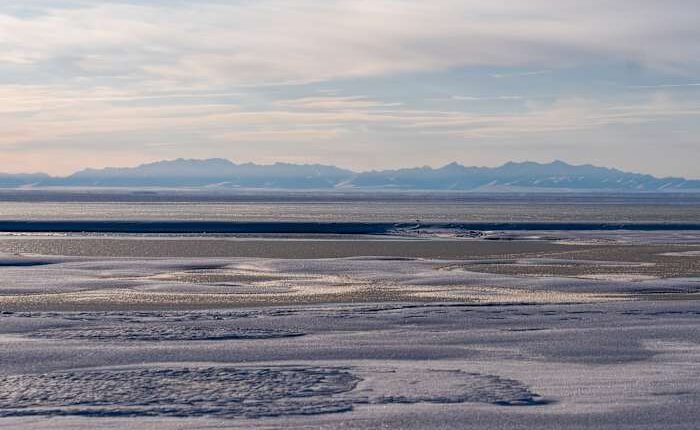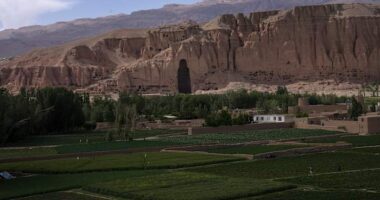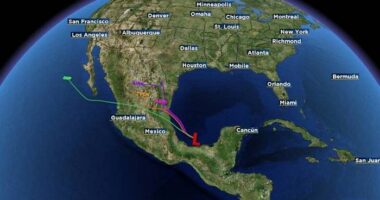
WASHINGTON – House Republicans have included a provision in their extensive tax cut bill to permit the sale of numerous acres of public lands in Nevada and Utah. This move has sparked anger from Democrats and environmental organizations who labeled the proposal a betrayal that might result in increased drilling, mining, and logging in the West.
The land sales proposal was adopted by Republicans on the House Natural Resources Committee early Wednesday morning. The original version of the bill had not included this provision due to bipartisan opposition.
Introduced by Republican Reps. Mark Amodei of Nevada and Celeste Maloy of Utah, the land sale provision aims to sell thousands of public land acres in the two states, some of which may be considered for affordable housing projects. Representative Joe Neguse from Colorado criticized the plan as “deeply irresponsible.”
“Public lands shouldn’t have a price tag on them. But (President) Donald Trump and his allies in Congress are working like mad to hand over our public lands to billionaires and corporate polluters to drill, mine and log with the bare minimum oversight or accountability,” said Athan Manuel, director of Sierra Club’s Lands Protection Program. The lands potentially for sale “belong to all Americans. They shouldn’t be given away to pad corporate bottom lines,” Manuel said.
The sales were approved as the Natural Resources committee voted 26-17 to advance legislation that would allow increased leasing of public lands for drilling, mining and logging while clearing the path for more development by speeding up government approvals. Royalty rates paid by companies to extract oil, gas and coal would be cut, reversing former Democratic President Joe Biden’s attempts to curb fossil fuels to help address climate change.
The measure is part of Trump’s big bill of tax breaks, spending cuts and beefed-up funding to halt migrants. House Speaker Mike Johnson has set a goal of passing the package out of his chamber by Memorial Day. All told, 11 different House committees are crafting portions of the bill.
Montana Rep. Ryan Zinke, a Republican and former Interior secretary in the first Trump administration, had said before the vote that he was drawing a “red line” on public land sales.
“It’s a no now. It will be a no later. It will be a no forever,” said Zinke, whose state includes large parcels of federally owned lands.
Zinke and Rep. Gabe Vasquez, D-New Mexico, are set to lead a new bipartisan Public Lands Caucus intended to protect and expand access to America’s public lands. The caucus was set to launch on Wednesday, hours after the resources panel vote.
Oil and gas royalty rates would drop from 16.7% on public lands and 18.75% offshore to a uniform 12.5% under the committee-passed bill, which still faces a vote in the full House and Senate once it is incoporated into the final legislative package. Royalties for coal would drop from 12.5% to 7%.
The measure calls for four oil and gas lease sales in the Arctic National Wildlife Refuge over the next decade. It also seeks to boost the ailing coal industry with a mandate to make available for leasing 6,250 square miles of public lands — an area greater in size than Connecticut.
Republican supporters say the lost revenue would be offset by increased development. It’s uncertain if companies would have an appetite for leases given the industry’s precipitous decline in recent years as utilities switched to cleaner burning fuels and renewable energy.
Drew McConville, a senior fellow at the liberal Center for American Progress, denounced the committee vote.
“The Trump tax bill was already a massive and historic sellout of U.S. lands and waters to corporate interests. This dark-of-night maneuver shows how shamelessly focused congressional Republicans are on sacrificing public benefits to pay for Trump’s reckless tax cuts. If this bill passes, the losses to America’s great outdoor legacy will be felt for generations,” McConville said in a statement.
Interior Secretary Doug Burgum and Housing and Urban Development Secretary Scott Turner in March proposed using “underutilized” federal land for affordable housing. Turner said some 7 million homes are needed. Officials under Biden also sought to use public lands for affordable housing, although on a smaller scale.
The agencies have not yet released more details of the proposal.
Copyright 2025 The Associated Press. All rights reserved. This material may not be published, broadcast, rewritten or redistributed without permission.

















